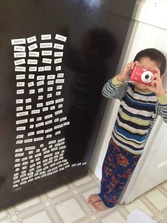Jessica Lahey, New York Times - Motherlode, July 31, 2012
"I know precisely where I lost my battle with math, the moment I was informed clearly and unequivocally that I simply wasn’t “a math person.” My seventh-grade math teacher, an otherwise lovely man, called each of his students up to his desk one by one in order to write a “1” (for the honors track) or “2” (for the standard track) on the school’s official math placement forms. As I watched from over his hunched and courduroyed shoulder, he wrote a beautiful, decisive and neat “1” on my form.
"There it was, in permanent ink. I was good at math.
"“Jess, could you come back up here for a minute?” he asked as I floated back to my seat.
"He reclaimed my form, and carefully overlaid that beautiful “1” with a dark, clumsy “2,” pressing hard with his black pen in order to make sure the ink obliterated any evidence of his indecision.
"And from then on, I wasn’t good at math anymore.
"From the moment I was relegated to standard math, I knew I was never going to be an engineer. I went through the motions of my math education, but never put any heart into the subject. My teachers didn’t push back very hard because the evidence was in: I just wasn’t a math person. I’d make it through to the day I could opt out of math forever, and I would never look back.
"Except, I did. For years, I have eyed my colleague Alison Gorman’s math classroom with wary suspicion. I peek in on her class when I hear laughter, wondering what could possibly inspire mirth in algebra class. I have watched with wonder during recess when her MathCounts students show up with their lunches, willing to spend valuable leisure time challenging each other to think through math problems."


 RSS Feed
RSS Feed
